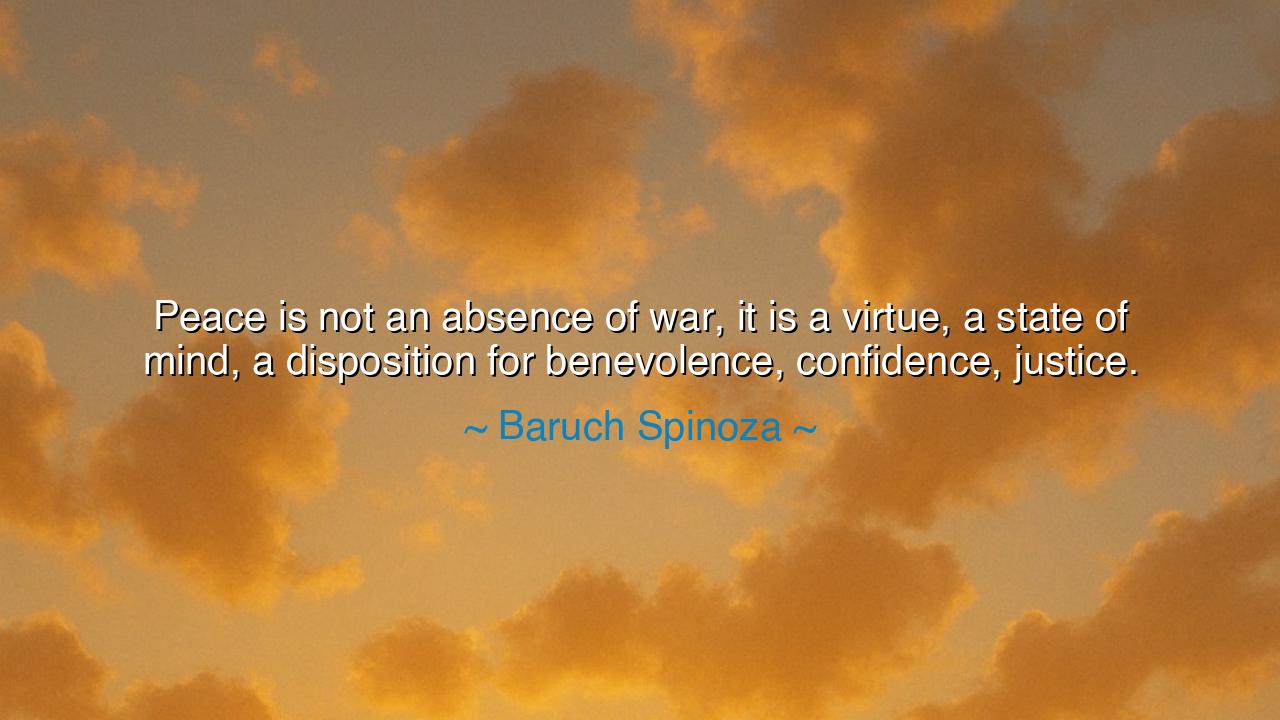
Peace is not an absence of war, it is a virtue, a state of mind
Peace is not an absence of war, it is a virtue, a state of mind, a disposition for benevolence, confidence, justice.






Hear the luminous wisdom of Baruch Spinoza, who declared: “Peace is not an absence of war, it is a virtue, a state of mind, a disposition for benevolence, confidence, justice.” These words, born in the 17th century from the pen of a philosopher who endured exile for his convictions, pierce through time to remind us of the true essence of peace. It is not a hollow silence bought by fear, nor a fragile pause between battles. Rather, it is a living force, a virtue rooted in the soul, a harmony of justice and goodwill that sustains both individuals and nations.
Mark this truth, O listener: many rulers declare that peace reigns when the cannons grow quiet and the swords are sheathed. But Spinoza teaches otherwise. For such “peace” is but a mask, a temporary stillness trembling with hidden tension. True peace of mind is not imposed by armies, nor sustained by treaties alone—it arises when hearts are inclined toward benevolence, when trust flows freely, when justice is practiced without partiality. In such a state, even if enemies surround, the soul stands untroubled, for it has cultivated its own fortress of calm.
Consider the story of Emperor Ashoka of India, who once bathed the earth in blood at the Battle of Kalinga. Victorious, he gazed upon the field strewn with corpses and was pierced by sorrow. In that moment, he realized that conquest had given him no peace, only emptiness. Turning from war, he embraced Buddhism, ruled with justice, and sought to spread benevolence across his empire. His reign became remembered not for the absence of battle, but for the presence of compassion, tolerance, and harmony. Ashoka embodies Spinoza’s truth: peace is not the stillness after war, but the flowering of virtue in the human heart.
Think also of Nelson Mandela, who after decades in prison emerged not with bitterness but with forgiveness. He could have sought vengeance, and many would have followed. Yet he chose reconciliation, urging black and white South Africans alike to build a nation founded on confidence and justice. His leadership proves that true peace is not passive; it is active, courageous, and grounded in moral strength. The absence of conflict in South Africa was not enough—what gave hope was the presence of goodwill, fairness, and a mind turned toward higher things.
But O children of wisdom, this teaching is not only for kings and nations. It belongs also to every soul. Do you think you have peace simply because you have no enemies? No—if your heart is restless with envy, fear, or resentment, then you are at war within yourself. To embody peace, you must cultivate virtue, treating others with kindness, living in truth, and seeking fairness in all dealings. Peace begins not in treaties between nations, but in the daily choices of men and women to act with benevolence rather than selfishness, with justice rather than cruelty.
Let us be warned: if we mistake peace for the mere absence of open conflict, we will never find it. We will live as nations always waiting for the next quarrel, as individuals always one insult away from rage. But if we understand peace as a state of mind, nurtured like a garden, then we may walk through storms with calm, face adversity with courage, and extend goodwill even to those who oppose us. Such peace cannot be stolen, for it is not dependent on outward conditions, but rooted in the soul itself.
Therefore, let Spinoza’s words be a beacon for all generations. Strive not merely for quiet, but for virtue. Build peace not only with treaties, but with deeds of benevolence. Strengthen peace not with walls, but with confidence and justice. And above all, remember that the truest peace is a power that begins within and radiates outward, shaping families, communities, and nations. For when peace is understood in this way, it ceases to be fragile silence and becomes an eternal harmony, strong enough to withstand the tempests of the world.






AAdministratorAdministrator
Welcome, honored guests. Please leave a comment, we will respond soon